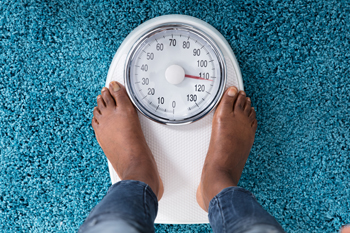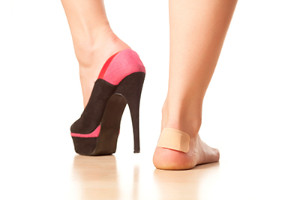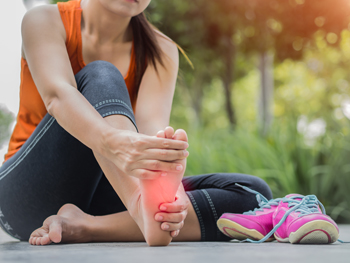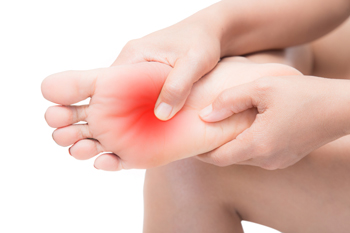 Many people suffer from heel pain, including people who are obese. Mild relief may be found when exercises and foot stretches are frequently performed. People who are overweight may have challenges in practicing a regular exercise regime, and this may be a result of the additional weight the body endures. There are aerobic exercises that can be performed, which can aid in weight loss. If traditional forms of exercise are difficult to partake in, there are other methods to accomplish a weight loss goal. These can include cycling and swimming. Additionally, it is helpful to reduce the amount of calories that are eaten, as this can be beneficial in attaining exercise goals. If you are overweight and experiencing heel pain, it is suggested to consult with a podiatrist who can guide you toward relief.
Many people suffer from heel pain, including people who are obese. Mild relief may be found when exercises and foot stretches are frequently performed. People who are overweight may have challenges in practicing a regular exercise regime, and this may be a result of the additional weight the body endures. There are aerobic exercises that can be performed, which can aid in weight loss. If traditional forms of exercise are difficult to partake in, there are other methods to accomplish a weight loss goal. These can include cycling and swimming. Additionally, it is helpful to reduce the amount of calories that are eaten, as this can be beneficial in attaining exercise goals. If you are overweight and experiencing heel pain, it is suggested to consult with a podiatrist who can guide you toward relief.
Obesity has become very problematic at this point in time and can have extremely negative effects on the feet. If you’re an obese individual and are concerned about your feet, contact Brent Harwood, DPM from Southeast Podiatry. Our doctor can provide the care you need to keep you pain-free and on your feet.
Obesity and Your Feet
Since your feet are what support your entire weight when standing, any additional weight can result in pain and swelling. Being overweight is one of the main contributors to foot complications.
Problems & Complications
Extra Weight – Even putting on just a few extra pounds could create serious complications for your feet. As your weight increases, your balance and body will shift, creating new stresses on your feet. This uneven weight distribution can cause pain, even while doing the simplest tasks, such as walking.
Diabetes – People who are overweight are at serious risk of developing type-2 diabetes, which has a drastic impact on the health of your feet. As you get older, your diabetes might worsen, which could lead to loss of feeling in your feet, sores, and bruises. You could also become more prone to various infections.
Plantar fasciitis – Pressure and stress that is placed on muscles, joints, and tendons can trigger plantar fasciitis, which is an inflammation of tissue that forms along the bottom of the foot.
If you have any questions please feel free to contact one of our offices located in Fairhope, Brewton, and Atmore, AL . We offer the newest diagnostic and treatment technologies for all your foot care needs.
Read more about How Obesity Affects Your Feet Many women enjoy wearing high heels despite knowing they can be harmful to the feet. There are many uncomfortable conditions that can originate from wearing this type of shoe, including shortened Achilles tendons, and a restriction in circulation. Additionally, the can bend forward, and it may feel like you are standing on tiptoes when high heels are worn. Many people experience bunions and hammertoes from wearing high heels. These ailments can be a result of having inadequate room for the toes to move freely in. Research has shown it is beneficial to alternate between wearing high heels and flat shoes, as this may help to reduce any foot damage that can occur. If you would like additional information about how high heels can harm the feet, please consult with a podiatrist.
Many women enjoy wearing high heels despite knowing they can be harmful to the feet. There are many uncomfortable conditions that can originate from wearing this type of shoe, including shortened Achilles tendons, and a restriction in circulation. Additionally, the can bend forward, and it may feel like you are standing on tiptoes when high heels are worn. Many people experience bunions and hammertoes from wearing high heels. These ailments can be a result of having inadequate room for the toes to move freely in. Research has shown it is beneficial to alternate between wearing high heels and flat shoes, as this may help to reduce any foot damage that can occur. If you would like additional information about how high heels can harm the feet, please consult with a podiatrist.
High heels have a history of causing foot and problems. If you have any concerns about your feet or , contact Brent Harwood, DPM from Southeast Podiatry. Our doctor can provide the care you need to keep you pain-free and on your feet.
Effects of High Heels on the Feet
High heels are popular shoes among women because of their many styles and societal appeal. Despite this, high heels can still cause many health problems if worn too frequently.
Which Parts of My Body Will Be Affected by High Heels?
What Kinds of Foot Problems Can Develop from Wearing High Heels?
How Can I Still Wear High Heels and Maintain Foot Health?
If you want to wear high heeled shoes, make sure that you are not wearing them every day, as this will help prevent long term physical problems. Try wearing thicker heels as opposed to stilettos to distribute weight more evenly across the feet. Always make sure you are wearing the proper shoes for the right occasion, such as sneakers for exercising. If you walk to work, try carrying your heels with you and changing into them once you arrive at work. Adding inserts to your heels can help cushion your feet and absorb shock. Full foot inserts or metatarsal pads are available.
If you have any questions please feel free to contact one of our offices located in Fairhope, Brewton, and Atmore, AL . We offer the newest diagnostic and treatment technologies for all your foot care needs.
Read more about Effect of High Heels on the Feet The location of the sesamoid bones is inside a tendon in the foot. The two bones are next to each other under the big toe joint in the bottom of the foot. They help to raise and move the big toe and can push off the ground while running. They take the strain off the foot while walking and running by absorbing the weight of the foot. If these bones should become inflamed, a condition that is referred to as sesamoiditis develops. It happens as a result of pressure that is exerted on the sesamoid bones and is a common condition among runners. There may be existing circumstances that lead to this ailment, including having high arches, or feet that have minimal cushioning on the sole of the foot. The symptoms that are common with sesamoiditis will typically include achiness in the ball of the foot, and a severe, throbbing sensation. If you feel you have sesamoiditis, it is advised to consult with a podiatrist, so proper treatment can begin.
The location of the sesamoid bones is inside a tendon in the foot. The two bones are next to each other under the big toe joint in the bottom of the foot. They help to raise and move the big toe and can push off the ground while running. They take the strain off the foot while walking and running by absorbing the weight of the foot. If these bones should become inflamed, a condition that is referred to as sesamoiditis develops. It happens as a result of pressure that is exerted on the sesamoid bones and is a common condition among runners. There may be existing circumstances that lead to this ailment, including having high arches, or feet that have minimal cushioning on the sole of the foot. The symptoms that are common with sesamoiditis will typically include achiness in the ball of the foot, and a severe, throbbing sensation. If you feel you have sesamoiditis, it is advised to consult with a podiatrist, so proper treatment can begin.
Sesamoiditis is an unpleasant foot condition characterized by pain in the balls of the feet. If you think you’re struggling with sesamoiditis, contact Brent Harwood, DPM of Southeast Podiatry. Our doctor will treat your condition thoroughly and effectively.
Sesamoiditis
Sesamoiditis is a condition of the foot that affects the ball of the foot. It is more common in younger people than it is in older people. It can also occur with people who have begun a new exercise program, since their bodies are adjusting to the new physical regimen. Pain may also be caused by the inflammation of tendons surrounding the bones. It is important to seek treatment in its early stages because if you ignore the pain, this condition can lead to more serious problems such as severe irritation and bone fractures.
Causes of Sesamoiditis
Treatment for sesamoiditis is non-invasive and simple. Doctors may recommend a strict rest period where the patient forgoes most physical activity. This will help give the patient time to heal their feet through limited activity. For serious cases, it is best to speak with your doctor to determine a treatment option that will help your specific needs.
If you have any questions please feel free to contact one of our offices located in Fairhope, Brewton, and Atmore, AL . We offer the newest diagnostic and treatment technologies for all your foot and ankle needs.
 Most people with rheumatoid arthritis experience pain in their feet at some point during their time with the ailment. Understanding the disease and the effects it could have on the feet may help you recognize the problem early and begin treatment. Rheumatoid arthritis is a disease in which the body attacks its own joints. This disease is unique in that many joints may be impacted at the same time. People with the disease may notice the development of bunions, hammertoes, and fallen arches. Additional foot complications affiliated with rheumatoid arthritis include heel pain, pinched nerves, nodules and rashes. The condition is painful and incurable. However, early treatment can help people with the disease control the discomfort and maintain their livelihoods. If you are experiencing any type of foot pain, it is suggested that you consult with a podiatrist.
Most people with rheumatoid arthritis experience pain in their feet at some point during their time with the ailment. Understanding the disease and the effects it could have on the feet may help you recognize the problem early and begin treatment. Rheumatoid arthritis is a disease in which the body attacks its own joints. This disease is unique in that many joints may be impacted at the same time. People with the disease may notice the development of bunions, hammertoes, and fallen arches. Additional foot complications affiliated with rheumatoid arthritis include heel pain, pinched nerves, nodules and rashes. The condition is painful and incurable. However, early treatment can help people with the disease control the discomfort and maintain their livelihoods. If you are experiencing any type of foot pain, it is suggested that you consult with a podiatrist.
Because RA affects more than just your joints, including the joints in your Feet, it is important to seek early diagnosis from your podiatrist if you feel like the pain in your feet might be caused by RA. For more information, contact Brent Harwood, DPM of Southeast Podiatry. Our doctor will assist you with all of your podiatric concerns.
What Is Rheumatoid Arthritis?
Rheumatoid Arthritis (RA) is an autoimmune disorder in which the body’s own immune system attacks the membranes surrounding the joints. Inflammation of the lining and eventually the destruction of the joint’s cartilage and bone occur, causing severe pain and immobility.
Rheumatoid Arthritis of the Feet
Although RA usually attacks multiple bones and joints throughout the entire body, almost 90 percent of cases result in pain in the foot area.
Symptoms
Diagnosis
Quick diagnosis of RA in the feet is important so that the podiatrist can treat the area effectively. Your doctor will ask you about your medical history, occupation, and lifestyle to determine the origin of the condition. Rheumatoid Factor tests help to determine if someone is affected by the disease.
If you have any questions please feel free to contact one of our offices located in Fairhope, Brewton, and Atmore, AL . We offer the newest diagnostic and treatment technologies for all your foot care needs.
Read more about Rheumatoid Arthritis in the Feet